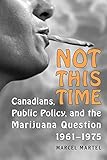Not This Time : Canadians, Public Policy, and the Marijuana Question, 1961-1975 / Marcel Martel.
Material type: TextSeries: HeritagePublisher: Toronto : University of Toronto Press, [2006]Copyright date: ©2006Description: 1 online resource (300 p.)Content type:
TextSeries: HeritagePublisher: Toronto : University of Toronto Press, [2006]Copyright date: ©2006Description: 1 online resource (300 p.)Content type: - 9780802093790
- 9781442627949
- 362.29/5/097109046
- HV5840.C3
- online - DeGruyter
| Item type | Current library | Call number | URL | Status | Notes | Barcode | |
|---|---|---|---|---|---|---|---|
 eBook
eBook
|
Biblioteca "Angelicum" Pont. Univ. S.Tommaso d'Aquino Nuvola online | online - DeGruyter (Browse shelf(Opens below)) | Online access | Not for loan (Accesso limitato) | Accesso per gli utenti autorizzati / Access for authorized users | (dgr)9781442627949 |
Browsing Biblioteca "Angelicum" Pont. Univ. S.Tommaso d'Aquino shelves, Shelving location: Nuvola online Close shelf browser (Hides shelf browser)

|

|

|

|

|

|

|
||
| online - DeGruyter Diaspora in the Countryside : Two Mennonite Communities and Mid-Twentieth Century Rural Disjuncture / | online - DeGruyter Indigenous Difference and the Constitution of Canada / | online - DeGruyter Property : Mainstream and Critical Positions / | online - DeGruyter Not This Time : Canadians, Public Policy, and the Marijuana Question, 1961-1975 / | online - DeGruyter The Order of Canada : Its Origins, History, and Developments / | online - DeGruyter Gendered Pasts : Historical Essays in Femininity and Masculinity in Canada / | online - DeGruyter Bedside Matters : The Transformation of Canadian Nursing, 1900-1990 / |
restricted access online access with authorization star
http://purl.org/coar/access_right/c_16ec
Drugs are part of every society, consumed for ritual or religious purposes, for pleasure, to enhance athletic performance, or as a means to relieve pain. Throughout the twentieth century, however, an arbitrary and shifting distinction was made between legal drugs that were prescribed and administered by the medical profession, and illegal drugs that were subject to state control and suppression. Illegal in Canada since 1923, marijuana is the most controversial of illegal drugs. Because it lacks the same addictive and harmful qualities of other illegal substances, such as heroin and cocaine, marijuana's negative social impact is questionable. In the 1960s interest groups - including university student associations, certain physicians, and others -, began demanding changes to the Narcotics Control Act, which governed the legal status of drugs, to decriminalize or legalize the possession of marijuana. In Not This Time, Marcel Martel explores recreational use of marijuana in the 1960s and its emergence as a topic of social debate. He demonstrates how the media, interest groups, state institutions, bureaucrats and politicians influenced the development and implementation of public policy on drugs. Martel illustrates how two loose coalitions both made up of interest groups, addiction research organizations and bureaucrats - one supporting the existing drug legislation, and the other favoring liberalization of the Narcotics Control Act - dominated the debate over the legalization of marijuana, and how those favoring liberalized drug laws, while influential, had difficulty presenting a unified front and problems justifying their cause while the health benefits of marijuana use were still in question. Exploring both sides of the debate, Martel presents the invigorating history of a question that continues to reverberate in the minds of Canadians. Disclaimer: Images removed at the request of the rights holder.
Mode of access: Internet via World Wide Web.
In English.
Description based on online resource; title from PDF title page (publisher's Web site, viewed 01. Nov 2023)


